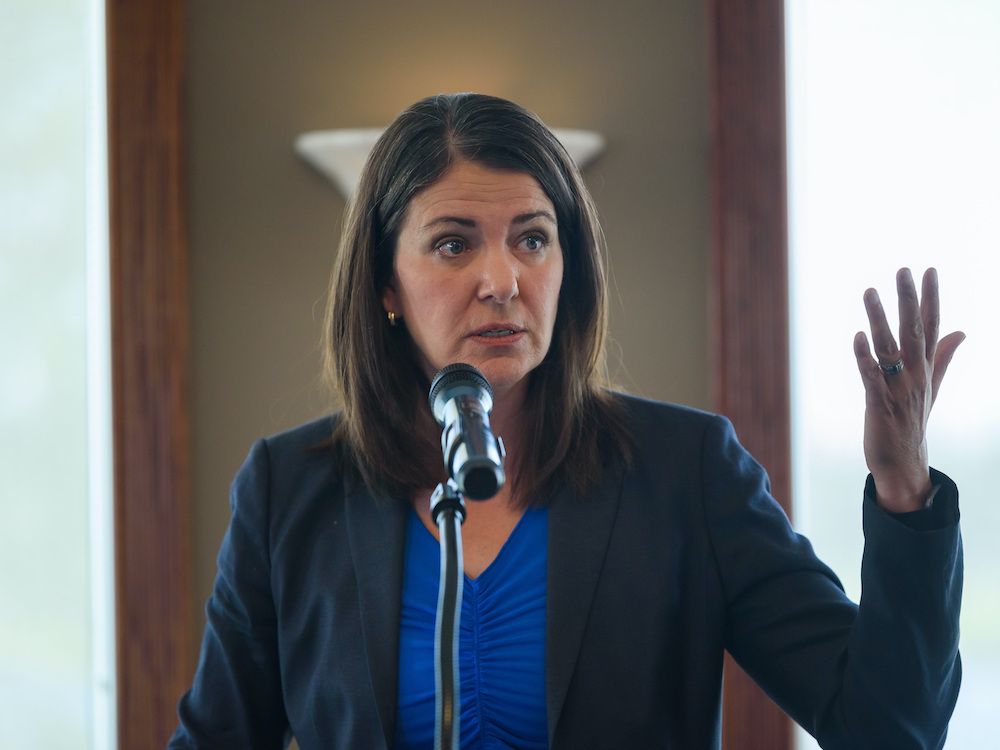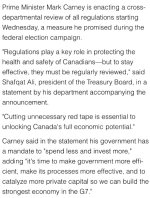Talk about misinformation! WOW!
Kelly McParland: How decades of Liberal indifference created Danielle Smith
The conclusion has clearly been drawn that the only way to get Ottawa’s attention is to create a crisisnationalpost.com
Well... not entirely wrong that's for sure. It is probably true that albertans demand more respect than they SHOULD get, and get less respect than they deserve.
Many think the feds make most of their money from alberta oil, which is no where remotely close to true. A large percent think somehow that albertans pay more into "equalization". This is false, equalization is paid from taxes and they pay the same tax rate as everyone else.
At the same time they're a "have" province that draws less in gov't transfers and money overall than most provinces, the success of their people means they normally pay higher than average income taxes due to their higher than average incomes and oil is an important strategic and economic resource that keeps our dollar stronger and such.
And alberta does get dumped on. Trudeau before getting elected said westerners and albertans were unfit to lead the country and it 'doesn't work' when they're allowed to try. The NEP was a horrid disaster for a generation of younger albertans. Alberta culture and heritage is utterly ignored other than to occasionally show up at a stampede.
So... this probably is the inevitalbe result which is a shame because it's the last thing alberta needs to be focused on right now.
Kelly McParland: How decades of Liberal indifference created Danielle Smith
- Thread starter The_Foxer
- Start date
You are using an out of date browser. It may not display this or other websites correctly.
You should upgrade or use an alternative browser.
You should upgrade or use an alternative browser.
Ah, I think he's being disingenuous but that's just me. I don't believe a word he's saying.View attachment 29883
???? Waffling & hedging at the Stampede????
I believe him. A pipeline will make the list. Where it will remain until we get a change of government.Ah, I think he's being disingenuous but that's just me. I don't believe a word he's saying.
Yup , see it is right here . On the list .I believe him. A pipeline will make the list. Where it will remain until we get a change of government.
Ontario’s Ring of Fire and Alberta’s oil sands are typically held up as two of the resource bounties that have been held back, or even thwarted, for years under the Trudeau government, whose attitude toward developing resources and infrastructure ranged at times from uninterested to hostile. The story of then environment minister Steven Guilbeault ordering a federal assessment of a planned Ontario highway because of a frog habitat served as a vivid exemplification of the atmosphere: it took a costly, time-consuming court battle to slap back another attempt by the federal government to overreach into provincial jurisdiction.
Plenty of economists agree that Canada needs to export its natural resources, as well as manufactured goods, as easily and efficiently as possible to reach its economic potential. But in many cases, those needed roads, rail lines, ports and pipelines don’t exist, or they’re antiquated and unable to compete, leaving resources in the ground and money and jobs in both native and non-native communities on the table.
(YouTube & "Wackonomics": Poilievre lambastes economy under Trudeau as Canadians are "living through hell")

 www.youtube.com
(YouTube & Pierre Poilievre Reacts to Liberals' ‘One Canadian Economy’ Bill)
www.youtube.com
(YouTube & Pierre Poilievre Reacts to Liberals' ‘One Canadian Economy’ Bill)
“Canadian jobs are at risk. Canadians’ livelihoods are at risk and, quite frankly, the prosperity of the country is at risk,” Tim Hodgson, the federal natural resources and energy minister, said earlier this month. “We need to do things that we have not done in a long time, in time frames we have not done since the end of World War Two.”
A lot of Indigenous leaders agree with the urgency of powering up the economy.

 apple.news
David Chartrand, president of the Manitoba Metis Federation, told the Senate that he supports the legislation because the tariffs imposed by U.S. President Donald Trump threaten the Canadian economy, which would cause hardship for his people. “We stand with you,” he said.
apple.news
David Chartrand, president of the Manitoba Metis Federation, told the Senate that he supports the legislation because the tariffs imposed by U.S. President Donald Trump threaten the Canadian economy, which would cause hardship for his people. “We stand with you,” he said.
Natan Obed, president of the Inuit Tapiriit Kanatami, said he’s concerned about the legislation’s ability to limit native rights but he’s also hopeful that big projects could be very good for Far North communities. “There’s an incredible opportunity to really become an Arctic nation,” Obed said.
Carney (Poilievre-lite with a Liberal twist) is now going to great lengths to show that he sees things that way too, emphasizing that Ottawa won’t deem projects to be in the national interest without first consulting with affected Aboriginal communities. The new office responsible for advancing big projects will include an Indigenous advisory council that he said will be responsible for ensuring that Aboriginal rights are respected.
After the federal bill was passed in Parliament, however, Carney acknowledged that there’s more work to be done and said that he plans to begin consultations with Indigenous groups July 17.

 apple.news
apple.news
Plenty of economists agree that Canada needs to export its natural resources, as well as manufactured goods, as easily and efficiently as possible to reach its economic potential. But in many cases, those needed roads, rail lines, ports and pipelines don’t exist, or they’re antiquated and unable to compete, leaving resources in the ground and money and jobs in both native and non-native communities on the table.

Pierre Poilievre Reacts to Liberals' ‘One Canadian Economy’ Bill #cdnpoli
"Our test is not whether or not legislation is perfect but whether it's better than the way things are,” says Conservative Leader Pierre Poilievre as he resp...
“Canadian jobs are at risk. Canadians’ livelihoods are at risk and, quite frankly, the prosperity of the country is at risk,” Tim Hodgson, the federal natural resources and energy minister, said earlier this month. “We need to do things that we have not done in a long time, in time frames we have not done since the end of World War Two.”
A lot of Indigenous leaders agree with the urgency of powering up the economy.
Liberals could find out soon whether their rushed projects bill will spark another Idle No More — National Post
If First Nations feel they aren't being properly consulted and treated as partners when a project infringes on their land or their rights, 'nothing’s off the table' for Indigenous activists
Natan Obed, president of the Inuit Tapiriit Kanatami, said he’s concerned about the legislation’s ability to limit native rights but he’s also hopeful that big projects could be very good for Far North communities. “There’s an incredible opportunity to really become an Arctic nation,” Obed said.
Carney (Poilievre-lite with a Liberal twist) is now going to great lengths to show that he sees things that way too, emphasizing that Ottawa won’t deem projects to be in the national interest without first consulting with affected Aboriginal communities. The new office responsible for advancing big projects will include an Indigenous advisory council that he said will be responsible for ensuring that Aboriginal rights are respected.
After the federal bill was passed in Parliament, however, Carney acknowledged that there’s more work to be done and said that he plans to begin consultations with Indigenous groups July 17.
Senate adopts Carney's fast-tracked major projects bill — well before Canada Day deadline — National Post
Many senators complained about the rushed process to adopt C-5, which did not leave them with enough time to properly review the legislation
That highway/train/pipes across the Prairie Boreal idea would double GDP overnight.Ontario’s Ring of Fire and Alberta’s oil sands are typically held up as two of the resource bounties that have been held back, or even thwarted, for years under the Trudeau government, whose attitude toward developing resources and infrastructure ranged at times from uninterested to hostile. The story of then environment minister Steven Guilbeault ordering a federal assessment of a planned Ontario highway because of a frog habitat served as a vivid exemplification of the atmosphere: it took a costly, time-consuming court battle to slap back another attempt by the federal government to overreach into provincial jurisdiction.
Plenty of economists agree that Canada needs to export its natural resources, as well as manufactured goods, as easily and efficiently as possible to reach its economic potential. But in many cases, those needed roads, rail lines, ports and pipelines don’t exist, or they’re antiquated and unable to compete, leaving resources in the ground and money and jobs in both native and non-native communities on the table.
(YouTube & "Wackonomics": Poilievre lambastes economy under Trudeau as Canadians are "living through hell")
(YouTube & Pierre Poilievre Reacts to Liberals' ‘One Canadian Economy’ Bill)
Pierre Poilievre Reacts to Liberals' ‘One Canadian Economy’ Bill #cdnpoli
"Our test is not whether or not legislation is perfect but whether it's better than the way things are,” says Conservative Leader Pierre Poilievre as he resp...www.youtube.com
“Canadian jobs are at risk. Canadians’ livelihoods are at risk and, quite frankly, the prosperity of the country is at risk,” Tim Hodgson, the federal natural resources and energy minister, said earlier this month. “We need to do things that we have not done in a long time, in time frames we have not done since the end of World War Two.”
A lot of Indigenous leaders agree with the urgency of powering up the economy.
David Chartrand, president of the Manitoba Metis Federation, told the Senate that he supports the legislation because the tariffs imposed by U.S. President Donald Trump threaten the Canadian economy, which would cause hardship for his people. “We stand with you,” he said.
Liberals could find out soon whether their rushed projects bill will spark another Idle No More — National Post
If First Nations feel they aren't being properly consulted and treated as partners when a project infringes on their land or their rights, 'nothing’s off the table' for Indigenous activistsapple.news
Natan Obed, president of the Inuit Tapiriit Kanatami, said he’s concerned about the legislation’s ability to limit native rights but he’s also hopeful that big projects could be very good for Far North communities. “There’s an incredible opportunity to really become an Arctic nation,” Obed said.
Carney (Poilievre-lite with a Liberal twist) is now going to great lengths to show that he sees things that way too, emphasizing that Ottawa won’t deem projects to be in the national interest without first consulting with affected Aboriginal communities. The new office responsible for advancing big projects will include an Indigenous advisory council that he said will be responsible for ensuring that Aboriginal rights are respected.
After the federal bill was passed in Parliament, however, Carney acknowledged that there’s more work to be done and said that he plans to begin consultations with Indigenous groups July 17.

Senate adopts Carney's fast-tracked major projects bill — well before Canada Day deadline — National Post
Many senators complained about the rushed process to adopt C-5, which did not leave them with enough time to properly review the legislationapple.news
Big investment, big return…for decades.That highway/train/pipes across the Prairie Boreal idea would double GDP overnight.



Etc…
Too many rules? Carney orders review of all government regulations — CBC News
Prime Minister Mark Carney is enacting a cross-departmental review of all regulations starting Wednesday, a measure he promised during the federal election campaign.
Alberta Premier Danielle Smith's government says it is planning to introduce legislation that would allow it to ignore international agreements signed by Ottawa.
The future legislation is listed in a new mandate letter Smith issued this week to the government's intergovernmental relations ministry, which the premier heads.
The letter says it's about protecting "Alberta's authority," and Smith's office added in a statement that it's also an issue of due process.

 apple.news
apple.news
The future legislation is listed in a new mandate letter Smith issued this week to the government's intergovernmental relations ministry, which the premier heads.
The letter says it's about protecting "Alberta's authority," and Smith's office added in a statement that it's also an issue of due process.
Alberta to legislate authority not to enforce international agreements Canada signs — The Canadian Press
Alberta Premier Danielle Smith's government says it is planning to introduce
Canada was founded as an economic union between provinces. Tariffs and other economic barriers were a significant problem, which is precisely why the federal government was given jurisdiction over interprovincial infrastructure like railways and pipelines. It is not an exaggeration to say resolving disputes like this over a potential West Coast pipeline is exactly Carney’s job.

 www.youtube.com
(YouTube & Poilievre tells Carney to ‘get out of the way’ on new pipeline project)
www.youtube.com
(YouTube & Poilievre tells Carney to ‘get out of the way’ on new pipeline project)
Firm political leadership from Ottawa is needed to change this legislative blockade, but the glimmers of that political will we saw in the last federal election seem to be fading. B.C. Premier Eby said he opposes any pipelines from Alberta…but what about pipelines that don’t originate from Alberta?
Ottawa has declared we are on our own in convincing Premier Eby, though Carney did say after the budget that “it’s going to happen.” (?)

 www.youtube.com
(YouTube & Mark Carney calls Pipeline Too Boring)
www.youtube.com
(YouTube & Mark Carney calls Pipeline Too Boring)

 apple.news
Failed leadership on this file will have multiple casualties throughout the entire Canadian economy: lower productivity, job losses, the value of our dollar, and more federal budget deficits and borrowing. It also deprives many Indigenous communities of their best opportunity to share in the wealth creation that new pipelines could and would bring in the coming decades.
apple.news
Failed leadership on this file will have multiple casualties throughout the entire Canadian economy: lower productivity, job losses, the value of our dollar, and more federal budget deficits and borrowing. It also deprives many Indigenous communities of their best opportunity to share in the wealth creation that new pipelines could and would bring in the coming decades.

Don’t expect any boring oil pipelines in Mark Carney’s announcement Thursday about projects of national interest. In his last few public appearances, Carney has downplayed the idea, downplayed the importance of the oil and gas industry and downplayed concerns the industry has about government regulation.

 apple.news
On Monday, Carney was asked by a journalist about the fact his budget didn’t contain any relief measures to allow the oil and gas industry to prosper. He was also dismissive of that, pointing to the clean electricity grids in Quebec and Nova Scotia, and spoke about LNG exports before inviting people to Prince Rupert on Thursday for his next announcement of major projects his government will back.
apple.news
On Monday, Carney was asked by a journalist about the fact his budget didn’t contain any relief measures to allow the oil and gas industry to prosper. He was also dismissive of that, pointing to the clean electricity grids in Quebec and Nova Scotia, and spoke about LNG exports before inviting people to Prince Rupert on Thursday for his next announcement of major projects his government will back.
I believe him. A pipeline will make the list. Where it will remain until we get a change of government.
Yup , see it is right here . On the list .

Poilievre tells Carney to ‘get out of the way’ on new pipeline project
Conservative Leader Pierre Poilievre says it’s up to the federal government to take action on a new pipeline project in Western Canada. Subscribe to CP24 to ...
Firm political leadership from Ottawa is needed to change this legislative blockade, but the glimmers of that political will we saw in the last federal election seem to be fading. B.C. Premier Eby said he opposes any pipelines from Alberta…but what about pipelines that don’t originate from Alberta?
Ottawa has declared we are on our own in convincing Premier Eby, though Carney did say after the budget that “it’s going to happen.” (?)

Mark Carney calls Pipeline Too Boring
Canada should be a World Energy Superpower But NO that's too boring! This is a big 🖕 to AlbertaWhile Brookfield just purchased $9 billion worth of pipeline...
Ted Morton: Albertans are tired of being resented while funding the rest of Canada — National Post
The federal government must approve a pipeline to the west coast
That highway/train/pipes across the Prairie Boreal idea would double GDP overnight.
Big investment, big return…for decades.
Enbridge spent over $1 billion developing a West Coast pipeline proposal-Northern Gateway. Despite the fact that this project included agreements with virtually every Indigenous community along the route, it was rejected by Ottawa. The suite of federal laws and regulations brought in since then scares off any similar proponent. The federal tanker ban makes any oil pipeline a non-starter. Even if an exception were made, the Impact Assessment Act would strangle it with red tape. If the feds decided to give a pipeline special status under their new Bill C-5 to fast track those regulations, their emissions cap for oil and gas would limit the ability to increase production to fill the new pipe.Centuries.

Don’t expect any boring oil pipelines in Mark Carney’s announcement Thursday about projects of national interest. In his last few public appearances, Carney has downplayed the idea, downplayed the importance of the oil and gas industry and downplayed concerns the industry has about government regulation.
LILLEY: Carney puts politics over 'boring' pipeline projects — Toronto Sun
PM is dismissive of questions about pipelines, about problems the oil and gas industry is facing.
That's a bit harsh. A plain Jane pipeline is indeed boring.Carney is scum.
Can boring pipelines carry more than boring oil?
Take a few to think.
Carney doesn't care as he doesn't have a vested interest in Canada. That's what I do know..That's a bit harsh. A plain Jane pipeline is indeed boring.
Can boring pipelines carry more than boring oil?
Take a few to think.
What do you know about Carney, Danielle Smith, Scott Moe and hydrogen?Carney doesn't care as he doesn't have a vested interest in Canada. That's what I do know..
That Carney had nothing to do with it?What do you know about Carney, Danielle Smith, Scott Moe and hydrogen?
Do with?That Carney had nothing to do with it?

Canada's Hydrogen Sector Boost Under New Liberal Government - Fuelcellsworks
The Canadian Hydrogen Association welcomes PM Mark Carney's focus on boosting the hydrogen industry with new government policies.
Hydrogen is going nowhere at present .Do with?

Canada's Hydrogen Sector Boost Under New Liberal Government - Fuelcellsworks
The Canadian Hydrogen Association welcomes PM Mark Carney's focus on boosting the hydrogen industry with new government policies.fuelcellsworks.com